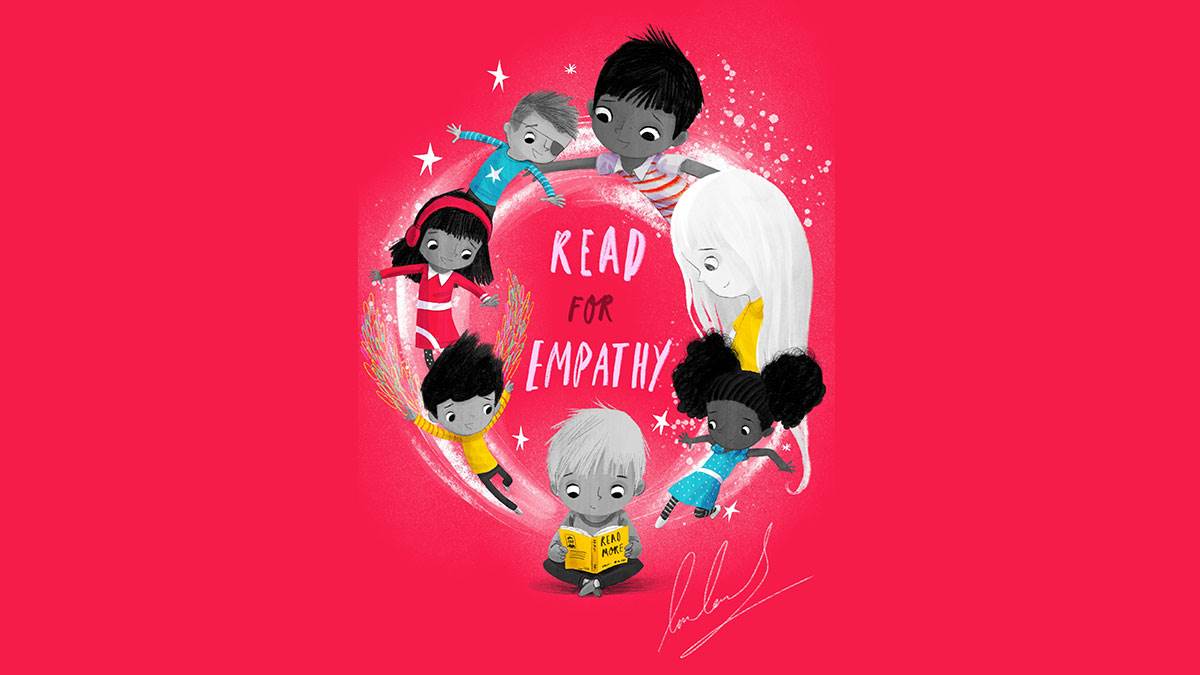Sharing stories to build empathy: Tom Percival on putting yourself in someone else's shoes
Published on: 11 June 2019 Author: Tom Percival
Children's author Tom Percival talks about the reasons that empathy and listening to others is so important and valuable – and why books are just the thing to help you to hear those voices.
 Illustration by Tom Percival
Illustration by Tom Percival
‘Okay then! On a count of three, I’d like everybody to do their LOUDEST MONSTER roar! Ready? One, two, three… ROAAAAARRRRRRRR!’
For some time, this was my default warm-up when visiting schools or book festivals. Of course I would swap ‘monster’ for a suitable character in my current picture book; dogs are great, bears work even better, and ghosts make a wonderfully loud spooky howl. (You might notice that to-date, I’ve not written any books about earwigs – what noise do earwigs even make?)
Anyway, this sort of interactive start to an event can get an audience in the mood for some fun. Of course, all children love fun – and most love to make a massive noise, too.
So, what’s changed?
Well, I still use this warm-up, but with a few adjustments. Having seen a few children wincing and holding their ears at my events, I decided that just because the majority of the kids loved to roar along, it wasn’t something I could do if a few felt uncomfortable. So now I always ask teachers and librarians if they know if anyone in the audience is sensitive to loud noises. If they are, I have a few, quieter, alternatives up my sleeve. It’s a simple step to take, but it means that everybody is going to enjoy my events.
I’ve been wondering whether there might be parallels here for life in general? Surely, if steps are taken to ensure that everyone’s needs are catered for, then everyone can feel included in society?
Empathy builds bridges
Obviously, it’s not just loud noises that can be problematic. Any sweeping decisions, which ignore society’s broader needs, can be damaging. The Centre For Literacy In Primary Education's (CLPE) research into representation in children’s books in 2017 discovered that less than 1 per cent of children's books featured a lead character from a BAME (black and minority ethnic) background.
Check out own research into representation in children's books
This kickstarted a sea change in publishing, as well as coinciding with the arrival of a whole new children’s publisher, the excellent Knights Of and their inclusive bookshop Round Table Books. This is a hugely important step – after all, if you don’t see yourself in the books that you read, then what does that say about your place in society? What does that say about how society values you?
To be considerate of other people and their differing needs and experiences is an essential part of being human. We have to be able to understand other people’s positions and feelings if we are to have any hope of collaborating or even just co-existing. In a world that can often feel divisive and fractured, empathy is a powerful bridge building tool.
Share stories to hear others
This is what EmpathyLab are doing with their Empathy Day event – building bridges, connecting people, and opening hundreds of windows to thousands of different lives. One of the main ways that they’re doing this is through sharing stories.
Humans have always communicated through stories and books are one of the most effective ways to understand someone else’s perspective. After all, when you read or listen to an audiobook, you are basically inside someone else’s head.
I recently read Crongton Knights by Alex Wheatle and would recommend it to anyone who wants to broaden their understanding of growing up in the cramped environment of inner-city council estates (as well as anyone who likes fast-paced, exciting stories with funny dialogue).
So why not join in with Empathy Day by sharing your own #ReadForEmpathy book recommendations? There are thousands of voices out there that should be heard – voices of people whose needs deserve to be met. Let’s make these voices heard.
Now, I wouldn’t even begin to pretend that I have a complete grasp of what it’s like to live any life other than my own, but being open to other people’s experiences is certainly the best place to start. After all, if you can put yourself in someone else’s position then it soon becomes apparent how you need to treat that person – or, perhaps, how you need to change your behaviour in the future.
So, back to my warm-up…
'On a count of three, I’d like everybody to lift their hands up as high as they can and waggle their fingers. Ready? One two, three… GO!’
Topics: Inclusive, Diversity (BAME), Features, Feelings






Add a comment